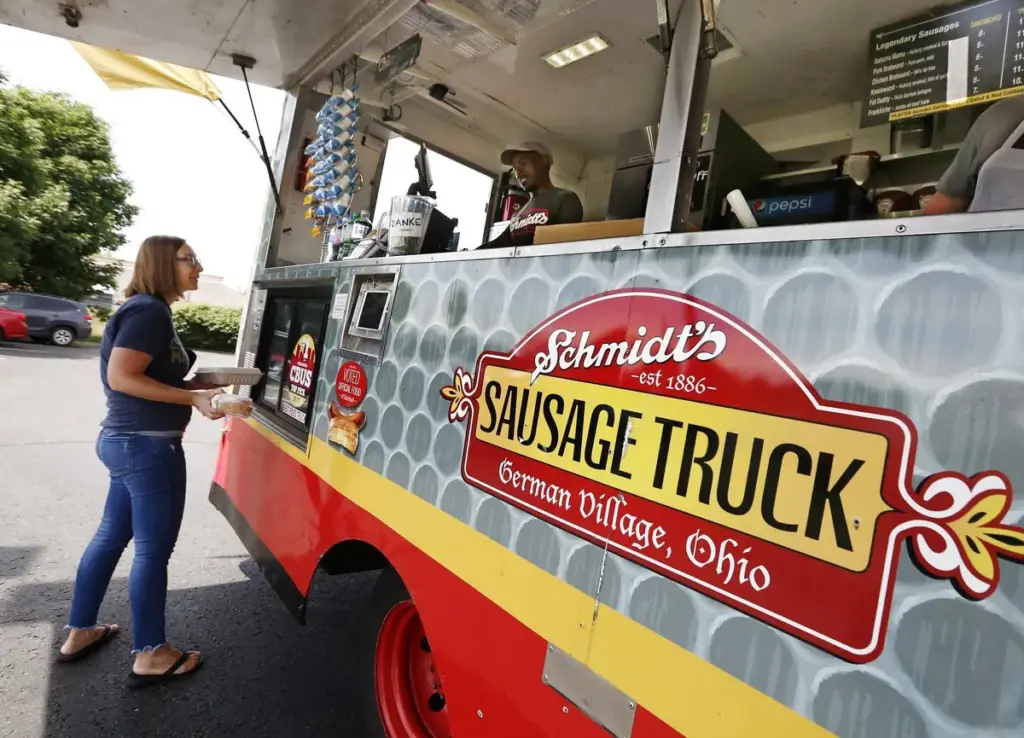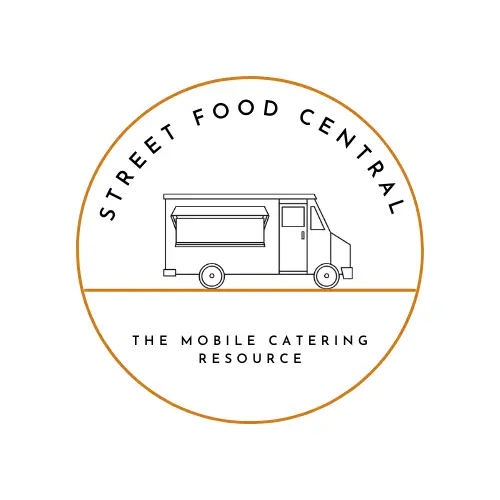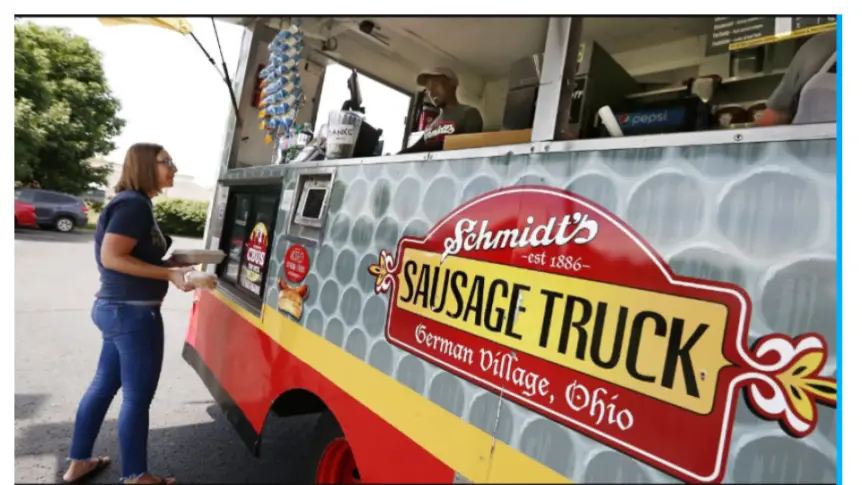See all the licenses and permits you need to operate in the state of Ohio legally

For most people, the worst part about starting a food truck business is navigating all the types of licenses, permits, and insurance needed to operate legally. And this can be especially overwhelming when you have to navigate federal, state, and local regulations at the same time.
So if you have landed on this article you may be wondering what licenses and permits you need to start a food truck in Ohio?
To run a food truck legally in the state of Ohio you need a Business License and Transient Vendors Licence which allows you to sell taxable goods and a Mobile Food Licence which ensures your food truck or trailer is fit to sell food to the general public.
You also need to make sure you have the correct driving license in place to drive the truck and commercial insurance to protect you against any claims.
In this article, I will guide you through the process of how to get all the food truck licenses and permits needed to operate in Ohio legally.
Contents:
- Business structure
- Taxes
- Business License
- Transient Vendor’s License
- Mobile Food license
- Driving License
- Insurance
- Key takeaways
1. Business structure
The first step is choosing a name for your company and checking that the name you want isn’t taken. You can do this here at the Ohio Secretary of State.
You then need to choose how you want to structure your food truck business, which will enable you to get a business license and register for the right tax code. There are a number of ways you can do this, each with its own requirements.
A Sole Proprietor is the simplest form of a business entity where you can operate under your own name or register with your local clerk’s office for an “Assumed Name Certificate” (DBA) which is a certificate that lets you trade under an assumed company name. You need to register with the county clerk in the state where you are located.
Other business structures exist such as corporations, Limited Liability Companies, Limited Partnerships, or Limited Liability Partnerships which are a little more complex to set up. If you are thinking about going with any of these options then you will need to register your food truck business with the Ohio Secretary Of State.
Helpful resources:
Cost:
- Assumed Name Certificate cost – $39
- Limited Company registration fee – $99
Related articles:
- What License Do You Need For A Food Truck In Florida?
- What Licenses Do You Need For A Food Truck In Texas?
- What Permits Are Needed For A Food Truck In New York?
2. Taxes
Once you have chosen a structure you need to register your food truck business at the federal level with the IRS to pay the correct taxes.
If you don’t intend to employ any staff and you want to operate your food truck as a sole proprietor or independent contractor then you can register with the IRS as self-employed and use your social security number for social security and medicare tax purposes.
If on the other hand, there are more people involved in your food truck business and/or you intend to employ staff then you will need to apply to the IRS for an “Employer’s Identification Number” (EIN number). This is a number assigned to every business so it can easily be identified by the IRS for taxation, which you will also need to open a business bank account.
You will also need to register at the state level with the Ohio Department of Taxation which should be able to advise you on what additional tax you may be liable such as sales tax.
Cost:
- EIN – Free
Helpful resources:
3. Business Licence
After you have decided on the structure and registered your food truck business it is time to apply for a business license. All food trucks must obtain an Ohio Business License to operate legally, which can be done by registering with the Ohio Secretary of State’s website
Helpful resources:
4. Transient Vendor’s License
Once you have a business license you will need to apply for a “Transient License”- This allows mobile food businesses that don’t have a fixed location to sell taxable products in multiple locations.
You can apply for a transient license here at the State of Ohio Department of taxation.
Helpful resources:
Cost:
- Ohio Vendor’s license – $25
5. Mobile Food license
Ohio state law requires all employees that process and handle food from mobile vehicles such as food trucks and food trailers must obtain a mobile food license.
Whilst food truck regulations can differ slightly depending on what county you are in, most local authorities require a minimum for any inspection, before issuing a mobile food license.
These include:
- Commercial-grade equipment – All equipment must be commercial-grade
- Floor plan – A detailed floorplan layout. including exits, sinks, and equipment
- Food menu – A full list of food and drinks that will be sold
- A three-compartment sink – A system for cleaning, washing and sanitizing equipment
- Fire suppression system – Will be needed for any fire inspection
- Water supply – A report of where clean water is sourced from and where dirty water is disposed of
- Food handlers card – A certificate that is awarded to managers and employees who have appropriate knowledge of the correct food safety practices such as safe prepping, cooking, and storage.
Once you have all these things in place you will need to apply to your local county office for an inspection of your mobile catering unit to be awarded a mobile catering license. You cannot serve food to the public until you have done this.
If you are using a gas supply and equipment such as propane bottles and fryers in your food truck you may also need an additional fire safety inspection by your local city’s Fire Department.
It’s worth contacting your local public health department to see if a separate fire and commissary unit inspection is needed as part of the approval process.
Cost:
- Ohio food handlers course – $7 – 10
Helpful resources:
Related articles:
8. Driving License
Aside from the licences and permits, you need to operate in Ohio you will also need the right driving license to drive your food truck from A to B. This is especially important if you employ staff as part of their role is to drive the truck.
According to the food truck builders M&R Speciality Trailers and Trucks, you should be able to drive a food truck with a Standard Class D driver’s license if your food truck weighs less than 26001 pounds. It’s worth noting that most food trucks have a typical weight of 1200-1600 pounds so this should suffice.
However, if your food truck exceeds a gross weight limit of 26001 pounds then you will need something called a CDL license. This is a commercial driver’s license used for driving large and heavy trucks.
For more information, it’s worth contacting the Ohio BMV
Helpful resources:
Related articles:
9. Insurance
In the state of Ohio, it is a legal requirement that all vehicles have a minimum amount of liability insurance to cover accidents and damages and workers’ compensation insurance for businesses that employ staff.
This means as a food truck business you will need liability insurance and workers’ compensation insurance (if you intend to employ people) at a minimum.
You should also think about additional insurance products, such as property and general liability insurance which protects you against theft, and damage to your property.
Cost:
- Wide-ranging as it is dependent on claims history, the type of vehicle, and coverage.
Helpful resources:
Related articles:
Key takeaway
Getting all the licenses and permits to operate a food truck in Ohio can be a bit overwhelming when you have to navigate both federal, state, and local regulations.
However, once you get the first couple of steps right like choosing your business structure and registering with the IRS to pay taxes the rest can be easier, especially when you have a roadmap of the steps you need to take.
So here’s a summary of the licenses and permits you need to operate a food truck in Ohio legally:
- Step 1: Choose a business structure & register with the IRS at the federal and state level
- Step 2: Get an Ohio Business License
- Step 3: Get a Transient Vendor’s permit
- Step 4: Get a Mobile Food License
- Step 7: Check your driving License
- Step 8. Get Commercial Insurance
Gavin D is the founder of Street Food Central and Tru Foo Juice Bar Co. and has worked in the mobile catering industry for over 7 years.

